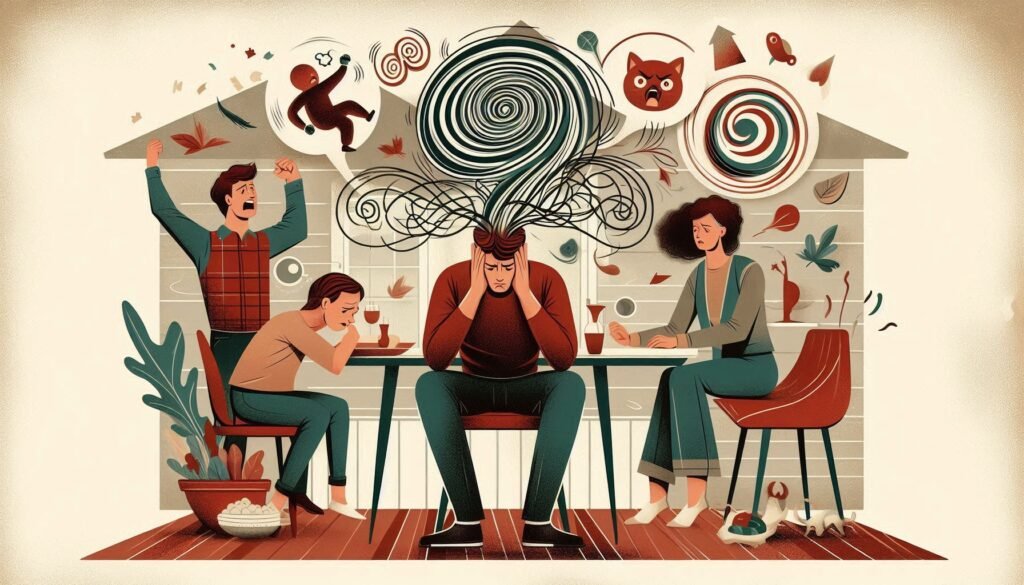Navigating the intricate landscape of romance can be a challenge for anyone, but for those with high levels of neuroticism, this journey often comes with unique hurdles. Neuroticism is characterized by emotional sensitivity and heightened responses to stress, which can influence how we connect with our partners. Understanding the impact of neuroticism on romantic relationships is vital for fostering healthier connections.
Whether it’s through attachment styles or communication patterns, these traits shape not only how love is expressed but also how conflicts arise and get resolved. For couples dealing with neurotic tendencies, recognizing these dynamics opens doors to deeper emotional intimacy and improved relationship satisfaction.
In this blog post, we’ll explore the various aspects of romance affected by neuroticism—from trust issues to sexual compatibility—and provide insight into effective coping strategies that can help both partners thrive in their connection. Join us as we dive deep into navigating love through the lens of emotional sensitivity!

Understanding Neuroticism: Traits and Manifestations in Romantic Contexts
Neuroticism is a personality trait that reflects emotional instability, anxiety, and moodiness. Individuals high in neuroticism often experience intense emotions and may be more prone to feelings of inadequacy or insecurity. In romantic contexts, this sensitivity can manifest as an overreaction to perceived slights or fears of rejection.
These traits often lead to rumination—analyzing conversations or actions excessively—which can create misunderstandings between partners. High-neurotic individuals might find themselves questioning their partner’s love or commitment at the slightest sign of distance. This constant state of alertness for potential threats makes it challenging to relax within the relationship.
Additionally, neuroticism can influence how affection is expressed. Partners might oscillate between seeking closeness and pushing away due to overwhelming emotions. Such behaviors complicate communication patterns and hinder emotional bonding.
Recognizing these traits helps both partners understand each other’s reactions better, paving the way for empathy and patience in navigating complex feelings within the relationship dynamic.
Attachment Styles: How Neuroticism Shapes Romantic Bonds
Attachment styles play a crucial role in how individuals with high neuroticism navigate romantic relationships. Those who are highly sensitive emotionally often exhibit anxious attachment styles. This can lead to heightened fears of abandonment and rejection, making them more prone to intense emotional responses.
In these partnerships, the behaviors of a neurotic partner might manifest as clinginess or over-analysis of their partner’s actions. They may frequently seek reassurance, which can strain the relationship. Their tendency toward negative thinking can create an atmosphere filled with self-doubt and insecurity.
On the flip side, some neurotic individuals might develop avoidant attachment styles as a defense mechanism against vulnerability. This avoidance creates distance and complicates intimacy in romantic bonds, leaving partners feeling neglected or unappreciated.
Understanding these dynamics is essential for both partners. Recognizing that neurotic traits influence attachment styles helps foster empathy and encourages open communication about needs within the relationship.
Communication Patterns: Neurotic Expression in Intimate Conversations
Communication is a cornerstone of any relationship, but for individuals high in neuroticism, it can be particularly complex. Neurotic partners often experience heightened emotional sensitivity. This means they may interpret neutral comments as criticism or signs of disinterest. Such perceptions can lead to misunderstandings during intimate conversations.
Additionally, those with neurotic traits might engage in excessive reassurance-seeking behavior. They often ask questions like “Do you still love me?” or “Are we okay?” These patterns stem from deep-rooted insecurities and fears about the stability of the relationship. While seeking validation is natural, this constant need for reassurance can strain communication.
Emotional flooding is another common occurrence among neurotic individuals during conflicts. When feelings become overwhelming, rational discussion tends to fade away. Instead of productive dialogue, arguments may spiral into emotional outbursts or withdrawal.
Self-criticism plays a significant role in how these individuals communicate their needs and desires. They may downplay their own feelings to avoid conflict, which leads to unresolved issues over time.
Conflict Resolution: Managing Disagreements with a Neurotic Partner
Navigating conflicts with a neurotic partner can be challenging. Their heightened emotional sensitivity often leads to intense reactions during disagreements. Understanding this trait is crucial for effective conflict resolution.
Active listening plays a key role in these situations. Make an effort to validate their feelings, even if you don’t fully agree. This approach creates a safe space where your partner feels heard and understood, which can diffuse potential escalation.
Avoid harsh criticisms or dismissive comments that may trigger defensiveness. Instead, focus on expressing your own feelings using “I” statements—this keeps the conversation constructive while minimizing blame. For instance, say “I feel frustrated when…” instead of “You always…”.
It’s also important to remain calm yourself. Your composed demeanor can help create balance in emotionally charged moments. Encourage open dialogue about how each person prefers to handle conflict and aim for compromise whenever possible; this fosters mutual respect and strengthens your bond over time.
Emotional Intimacy: Challenges and Opportunities for Highly Neurotic Individuals
Emotional intimacy is a double-edged sword for individuals high in neuroticism. Their heightened emotional sensitivity can lead to rich, deep connections but may also invite significant challenges. They often experience intense feelings that make vulnerability both daunting and exhilarating.
Highly neurotic individuals may struggle with openness due to fears of rejection or judgment. This apprehension can cause them to withhold their true thoughts and feelings, potentially stunting the growth of intimacy in relationships. Their partners might find it challenging to navigate these emotional barriers.
However, these same traits can foster profound empathy and understanding when managed well. Neurotic partners are often attuned to their partner’s emotions, creating an environment ripe for connection if they feel secure enough to share openly.
With awareness and effort from both sides, opportunities abound for building strong emotional bonds. Understanding one another’s vulnerabilities paves the way for deeper trust and closeness within romantic relationships marked by high levels of neuroticism.
Trust Issues: Overcoming Insecurities in Neurotic Romantic Relationships
Trust issues often surface in relationships where one partner exhibits high neuroticism. This emotional sensitivity can lead to heightened feelings of insecurity, which may prompt constant questioning about the other person’s loyalty or intentions. These doubts stem from an internal narrative that amplifies fears and anxieties.
To overcome these insecurities, open communication is essential. Partners should create a safe space for discussing feelings without judgment. By expressing their concerns candidly, they can demystify misunderstandings and reinforce trust within the relationship.
Additionally, reassurance plays a crucial role in alleviating anxiety-driven worries. Regular affirmations of love and commitment can help soothe a neurotic partner’s fears while fostering resilience against negative thought patterns.
Setting boundaries is vital for both partners. Establishing guidelines on how to address concerns allows for healthy dialogue during conflicts, reducing the likelihood of misinterpretation and reinforcing mutual respect within the relationship dynamic.
Sexual Satisfaction: The Influence of Neuroticism on Physical Intimacy
Neuroticism can significantly influence sexual satisfaction within romantic relationships. Individuals high in neurotic traits often experience heightened anxiety and self-doubt, which can manifest during intimate moments. This emotional sensitivity may lead to worries about performance or body image, creating barriers to genuine connection.
Moreover, partners with high neuroticism might find it challenging to communicate their desires openly. They may fear rejection or misinterpret cues from their partner, leading to misunderstandings that hinder intimacy. The resulting tension can contribute to a cycle of disappointment and frustration.
On the flip side, this emotional intensity might enhance some aspects of physical intimacy for couples willing to navigate these challenges together. Partners who understand each other’s sensitivities could forge deeper connections through empathy and validation.
Creating an environment where both partners feel secure is crucial for fostering sexual satisfaction. Open communication about needs and boundaries allows individuals with neurotic tendencies to engage more fully in their intimate lives without the weight of insecurity holding them back.
Long-Term Relationship Outcomes: Stability and Satisfaction with Neurotic Traits
Neuroticism can significantly influence long-term relationship outcomes. Couples where one or both partners exhibit high levels of neurotic traits may experience fluctuating emotional stability. This can lead to challenges in maintaining a steady connection over time.
However, it’s essential to recognize that neurotic individuals are often highly sensitive and aware of their partner’s feelings. This heightened emotional awareness can foster deep connections when nurtured properly. Partners who understand this aspect might find ways to support each other through ups and downs.
Satisfaction within these relationships largely depends on the ability to communicate effectively. Open discussions about emotions, fears, and concerns can mitigate misunderstandings that arise from neurotic tendencies. Active listening plays a crucial role in ensuring both partners feel heard.
While conflicts may be more pronounced due to anxiety-driven reactions, couples committed to personal growth often develop resilience together. With patience and understanding, they can create a stable foundation despite inherent challenges related to neuroticism.
Coping Strategies: Supporting a Neurotic Partner in Romantic Relationships
Supporting a neurotic partner requires patience and understanding. Acknowledge their feelings without judgment. Validating their emotions helps create a safe space for open communication.
Encouraging healthy coping mechanisms is essential. Suggest mindfulness techniques or journaling as ways to process anxiety. These tools can empower your partner to manage overwhelming thoughts more effectively.
Establishing consistent routines can also provide stability. Predictability in daily life helps reduce stress for those prone to worry. Share responsibilities and create rituals that foster connection, like weekly date nights or shared hobbies.
Practice active listening when they express concerns or fears. Sometimes just being there can be the strongest support you offer. Reassure them of your commitment, creating an environment where vulnerability feels acceptable and love flourishes despite challenges associated with neuroticism.
Relationship Therapy: Tailored Approaches for Couples Dealing with Neuroticism
Navigating the complexities of neuroticism within romantic relationships can be challenging, yet it’s important to recognize that help is available. Relationship therapy offers tailored approaches aimed at addressing the unique issues faced by couples where one or both partners exhibit high levels of neurotic traits.
Therapists often utilize techniques such as cognitive-behavioral therapy (CBT) to help individuals understand and modify their patterns of thought and behavior. This approach assists partners in recognizing their triggers and developing healthier responses during moments of emotional distress. Additionally, emotion-focused therapy can strengthen emotional connections by fostering better communication skills between partners.
Couples may also benefit from learning about attachment styles, which are influenced by neurotic tendencies. Understanding each other’s backgrounds can cultivate empathy and patience in handling sensitive emotions. Group therapies provide a platform for sharing experiences with others facing similar challenges, promoting community support.
Relationship therapy aims not only to address problems but also to bolster emotional intimacy and trust between partners. By seeking professional guidance, couples can transform potential conflicts into opportunities for growth—enhancing their connection despite the impact of neuroticism on romantic relationships.


